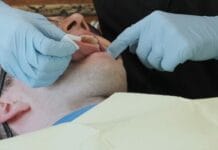As dental hygienists, we know the importance of maintaining oral health, not just for a healthy smile, but for overall health too. Recent research from Hiroshima University has shed light on an intriguing connection between periodontitis and atrial fibrillation (AFib), a condition characterized by an irregular heartbeat.1
The Study
Considering the evidence of the oral-systemic link, the implications that inflammation due to periodontal pathogens may extend beyond the oral cavity and reach as far as the heart is not surprising. The Hiroshima University research team embarked on this study with 76 patients with heart disease to delve deeper into this potential link.
There is clear evidence that periodontitis causes chronic inflammation. This inflammation may play a crucial role in the progression of atrial fibrosis and the pathogenesis of atrial fibrillation (AFib). Atrial fibrosis is scarring of the heart and a characteristic of AFib.
The team hypothesized that periodontitis could worsen atrial fibrosis. They aimed to clarify the relationship between the clinical status of periodontitis and the degree of atrial fibrosis through a histological study of left atrial appendages.
The researchers analyzed heart tissue, specifically the scarred parts, to understand the correlation between the severity of periodontitis and the extent of heart scarring. Their findings revealed a correlation: the more severe the periodontitis, the worse the heart scarring. This suggests that periodontitis could potentially escalate heart inflammation, leading to AFib.
Results
The results provide preliminary evidence that periodontitis can exacerbate atrial fibrillation. This information could be used to identify periodontitis as a modifiable risk factor for atrial fibrillation. While maintaining a healthy weight, regular exercise, and limiting tobacco and alcohol use remain key to managing any chronic condition, treating and managing periodontitis could potentially enhance cardiac care outcomes in AFib patients. However, the study only establishes a correlation, not causation, and further research is needed to prove a causal relationship definitively.
Clinical trials to expand on these findings will help confirm that periodontitis is a modifiable risk factor for atrial fibrillation. Preventing and treating periodontitis is a cost-effective target among known AFib risk factors, and if the study series proves successful, it could benefit many people worldwide.
If a causal link is indeed identified between periodontitis and AFib, it will be important to bring in dental professionals to collaborate with primary care physicians and cardiologists to help manage the oral health of the patient. This research has the potential to further bridge the gap between medicine and dentistry.
Conclusion
As dental hygienists, this research underscores the importance of our role in not just maintaining oral health but potentially contributing to heart health as well. It’s a reminder that the work we do goes beyond the dental chair and can have far-reaching impacts on our patients’ overall health.
Before you leave, check out the Today’s RDH self-study CE courses. All courses are peer-reviewed and non-sponsored to focus solely on pure education. Click here now.
Listen to the Today’s RDH Dental Hygiene Podcast Below:
Reference
- Miyauchi, S., Nishi, H., Ouhara, K., et al. Relationship Between Periodontitis and Atrial Fibrosis in Atrial Fibrillation: Histological Evaluation of Left Atrial Appendages.JACC: Clinical Electrophysiology. 2023;9(1): 43-53. https://doi.org/10.1016/j.jacep.2022.08.018











